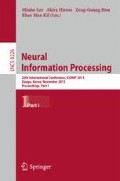Abstract
Word sense disambiguation (WSD) is essential for natural language understanding applications such as machine translation, question & answering, and natural language interface, since the performance of such applications depends on the senses of lexicons. Thus, it is natural to consider lexicons as the most crucial features in WSD. However, due to the extensiveness of lexical space, WSD methods based on machine learning techniques with lexical features suffer from the sparse data problem. To tackle this problem, this paper proposes a hybrid approach which separately copes with an error-prone data due to sparsity. A data is regarded as error-prone if its nearest neighbors are relatively distant and their senses are uniformly distributed. Then, our hybrid approach focuses on such an error-prone data without tuning of a base method. In the experiments, the k-nearest neighbor method is used as a base method. If a data is determined as an error-prone case, it is processed by a prototype based method. The prototype based method takes an advantage from overall training examples rather than depends on only several neighbors. The experimental results on Senseval-3 nouns show that an error-prone data is effectively detected by the proposed method and our hybrid approach outperforms the ordinary k-nearest neighbor method and the prototype based method.
Access this chapter
Tax calculation will be finalised at checkout
Purchases are for personal use only
Preview
Unable to display preview. Download preview PDF.
References
Mihalcea, R., Chklovski, T., Kilgarriff, A.: The senseval-3 english lexical sample task. In: Senseval-3: Third International Workshop on the Evaluation of Systems for the Semantic Analysis of Text, Barcelona, Spain, pp. 25–28 (2004)
Francis, W.N., Kucera, H.: Computational analysis of present-day american english (1967)
Agirre, E., de Lacalle, O.L., Martınez, D.: Exploring feature spaces with svd and unlabeled data for word sense disambiguation. In: Proceedings of RANLP (2005)
Barnett, V., Lewis, T.: Outliers in statistical data, vol. 3. Wiley, New York (1994)
Gliozzo, A., Giuliano, C., Strapparava, C.: Domain kernels for word sense disambiguation. In: Proceedings of ACL, pp. 403–410. ACL (2005)
Aggarwal, C.C., Yu, P.S.: Outlier detection for high dimensional data. In: ACM Sigmod Record, vol. 30, pp. 37–46. ACM (2001)
Hodge, V.J., Austin, J.: A survey of outlier detection methodologies. Artificial Intelligence Review 22(2), 85–126 (2004)
Author information
Authors and Affiliations
Editor information
Editors and Affiliations
Rights and permissions
Copyright information
© 2013 Springer-Verlag Berlin Heidelberg
About this paper
Cite this paper
Han, YJ., Lee, SJ., Park, S.Y., Park, SB. (2013). Detection of Error-Prone Cases for Word Sense Disambiguation. In: Lee, M., Hirose, A., Hou, ZG., Kil, R.M. (eds) Neural Information Processing. ICONIP 2013. Lecture Notes in Computer Science, vol 8226. Springer, Berlin, Heidelberg. https://doi.org/10.1007/978-3-642-42054-2_13
Download citation
DOI: https://doi.org/10.1007/978-3-642-42054-2_13
Publisher Name: Springer, Berlin, Heidelberg
Print ISBN: 978-3-642-42053-5
Online ISBN: 978-3-642-42054-2
eBook Packages: Computer ScienceComputer Science (R0)

